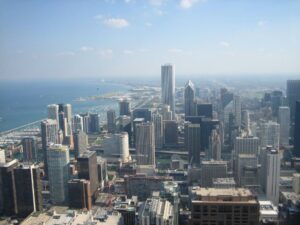 Named after French explorers, “Illinois” is the French spelling of the Illinois and Peoria Indian word “iliniwok,” meaning men or warriors. Illinois is known as the “Land of Lincoln” or The “Prairie State.” The state had two capitols (Kaskaskia and Vandalia) before Springfield was the chosen capital in 1837 by state legislators under the leadership of Abraham Lincoln. In this week’s blog we focus on the Midwest state of Illinois.
Named after French explorers, “Illinois” is the French spelling of the Illinois and Peoria Indian word “iliniwok,” meaning men or warriors. Illinois is known as the “Land of Lincoln” or The “Prairie State.” The state had two capitols (Kaskaskia and Vandalia) before Springfield was the chosen capital in 1837 by state legislators under the leadership of Abraham Lincoln. In this week’s blog we focus on the Midwest state of Illinois.
Business Climate
Illinois is the fifth largest state in the nation with approximately 12.8 million residents. The strength of the economy in the state is based on professional and business services, education, healthcare, leisure and hospitality services. While the state’s manufacturing industry has declined over the years, it is consistent with national trends. The largest private employers in Illinois are major retailers, large healthcare providers, equipment manufacturers, and nationwide financial service providers. According to the U.S. Bureau of Labor Statistics, Illinois averaged 5.813 million nonfarm payroll jobs and an unemployment rate of 8.4% in fiscal year 2014.
Taxes
The corporate income tax rate was 4.8% and individual income tax rate was 3% before both were increased to 7% and 5% respectively in 2011 to compensate for the state’s financial difficulties. According to Taxfoundation.org, the added revenue from significant tax increases in 2011 was not enough to extinguish the mounting debt. The corporate income tax increase led to major corporations considering packing up shop before the state stepped in with targeted incentive packages.
Illinois levies a 6.25% general sales tax on consumers, which is above the national average of 5.45%. The average local tax rate is an additional 1.94% on average. Collectively, the state collects $1,425 per person in general sales tax and excise taxes.
Tax Credits & Incentives
The state offers various tax credits and incentives to qualified businesses who meet certain criteria.
Enterprise Zone Program: This program is designed to stimulate economic growth and neighborhood revitalization to economically challenged areas. The Illinois Enterprise Zone Act was signed into law December 7, 1982. Business located in designated enterprise zones can become eligible for state and local tax incentives, regulatory relief, and improved governmental services. Incentives include: an exemption on the retailers’ occupation tax paid on building materials, and .5% investment tax credit on qualified property. Some additional exemptions exist for state sales tax on purchases of personal property used in the manufacturing process or in operations for a pollution control facility. The Sales Tax Exemption in addition to other exemptions requires a submission of an application to the Department of Commerce and Economic Opportunity. The application must be certified by the department.
Economic Development for a Growing Economy Tax Credit Program (“EDGE”): Designed to encourage companies to locate or expand operations in Illinois when there is active consideration of a competing location in another State, this program can provide tax credits to qualifying companies. The amount of the tax credit is equal to the amount of state income taxes withheld from the salaries of employees in the newly created job. The non-refundable credits can be used against corporate income taxes to be paid over a period not to exceed 10 years. To qualify, a company must provide documentation proving that there is competition with a competing state, agree to make an investment of at least $5 million in capital improvements, and create a minimum of 25 new full-time jobs in Illinois. Different thresholds exist for companies with 100 or fewer employees.
Random Illinois Facts
- World’s first skyscraper was a home insurance building built in Chicago in 1885.
- Illinois is home to the first McDonald’s.
- Of the 44 presidents of the United States, only 1 was born in Illinois. *Guess which?
Photo Credit: teekay72 via Flickr
*Ronald Reagan



















